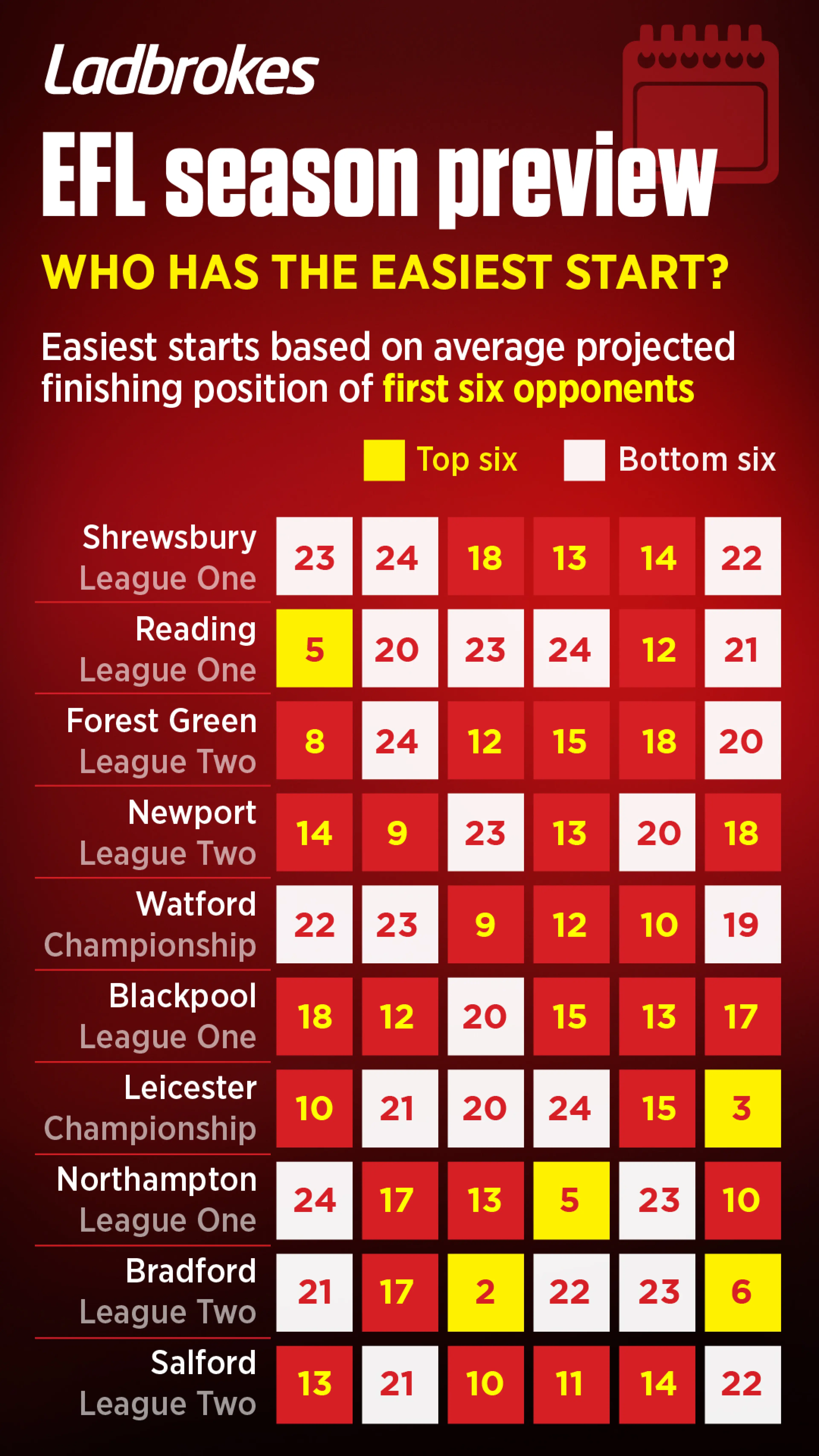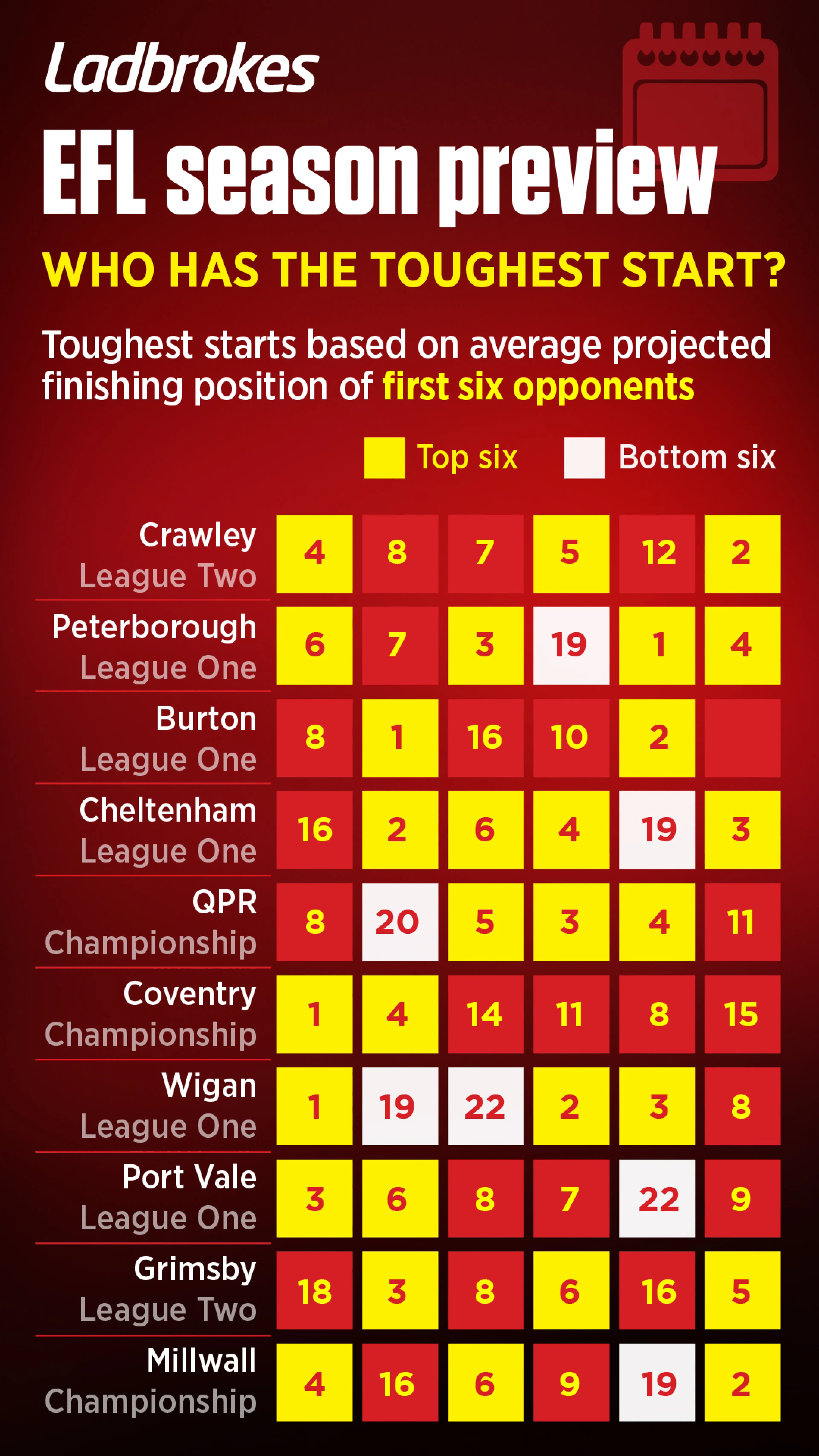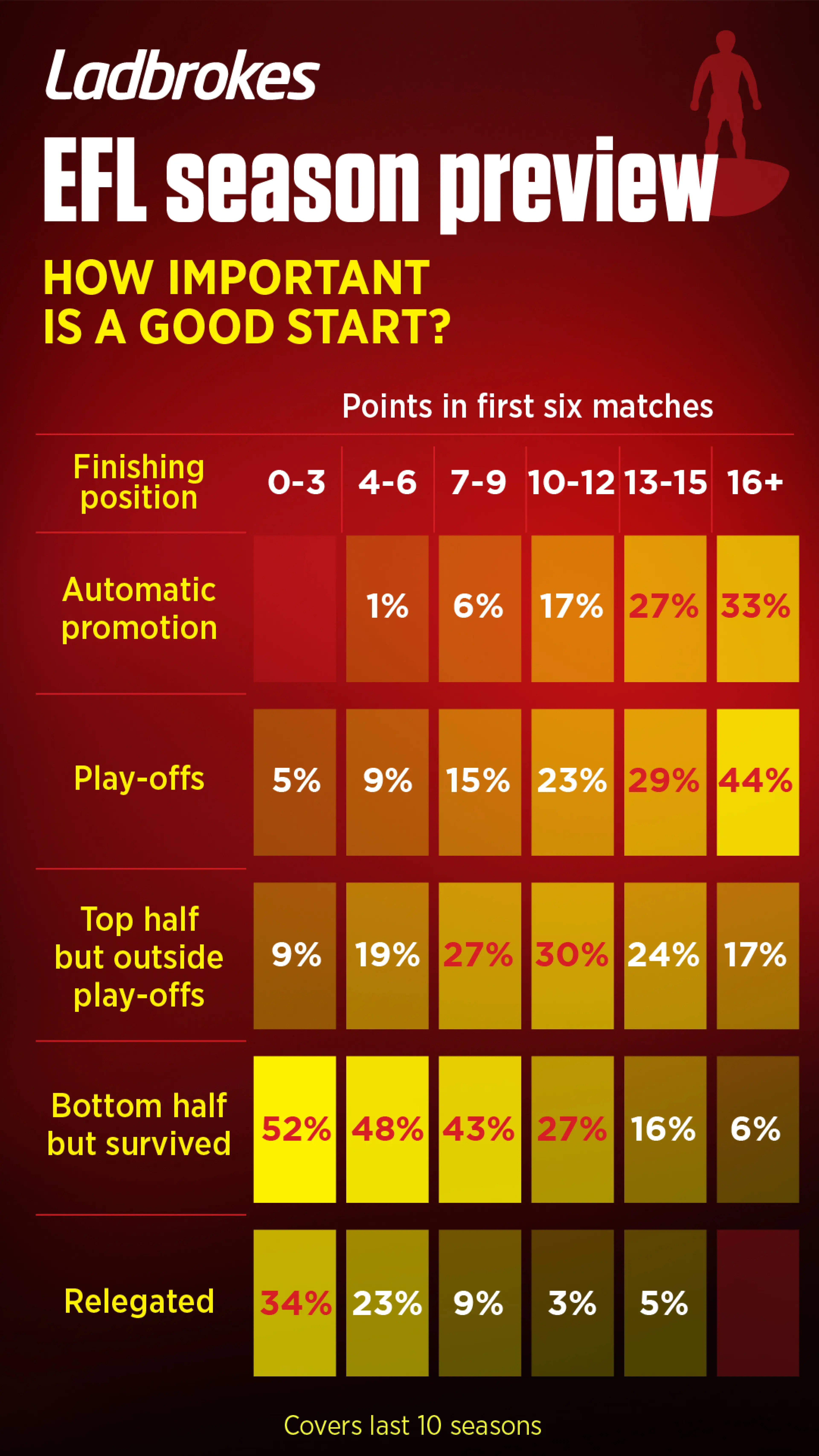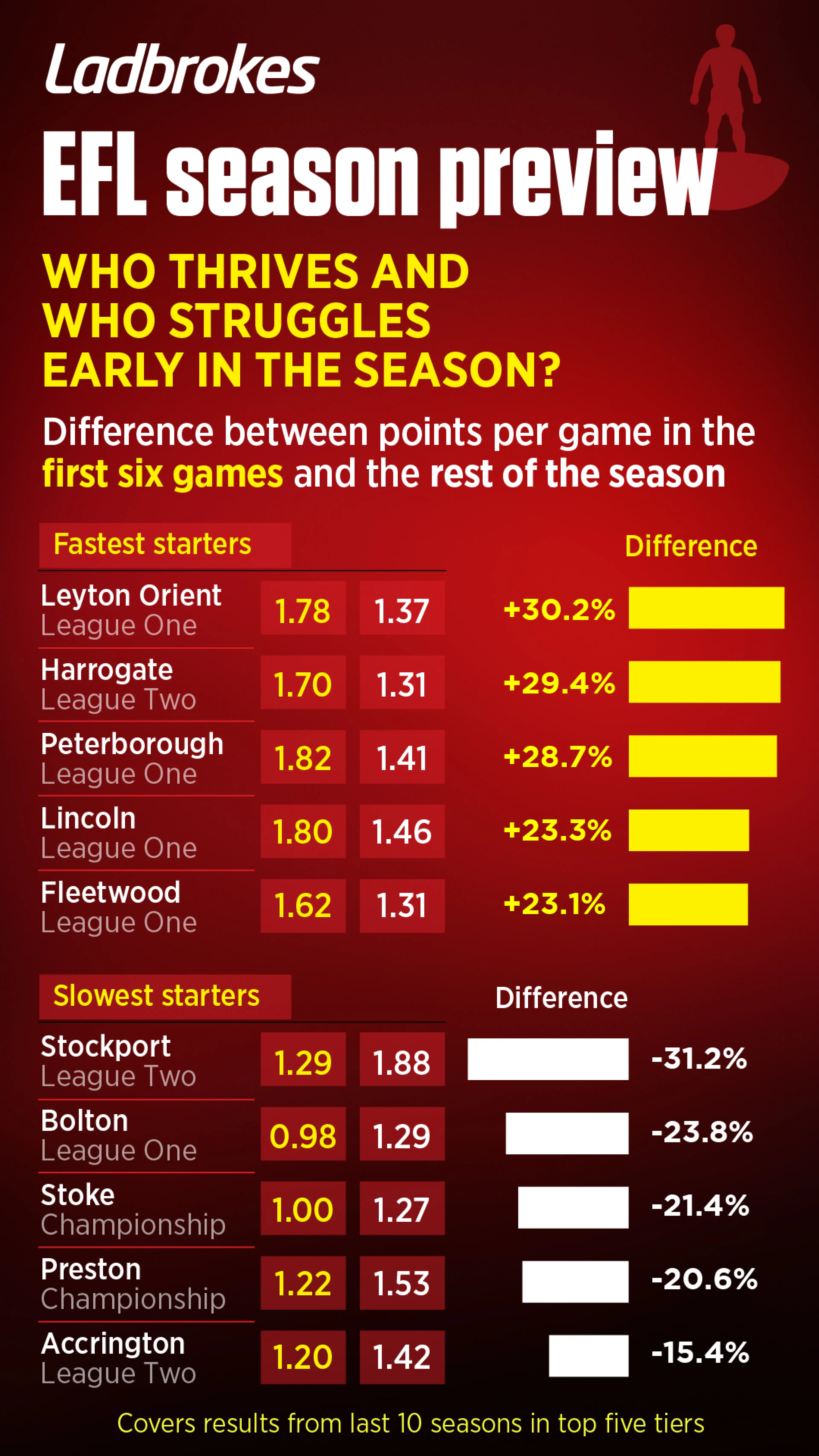Guide to the EFL 2023-24 season
Published:
The EFL 2023-24 season gets under way this weekend as the Championship, League One and League Two take centre stage.
The English Football League remains the heartbeat of the domestic game, with 72 teams from all over the country due to play a total of 1,656 matches between now and early May.
Ahead of the big kick-off we have studied the fixture list and analysed a decade’s worth of results to provide a comprehensive guide of what to expect in the EFL 2023-24 season.
Who has the easiest start?
Firstly, to assess each side’s immediate prospects, we have used our latest odds to rank teams by their most likely finishing position and compared their opening schedules.
League One Shrewsbury have the most comfortable opening run of any EFL side, with all of their first six opponents predicted to finish in the bottom half. The Shrews’ opening two fixtures against Cheltenham and Stevenage – the weakest teams in the division according to the odds – offer new boss Matt Taylor the chance to get off to a perfect start.

Staying in the third tier, Reading rank second for easiest starts having been relegated from the Championship last season. New manager Ruben Selles will pit his side against last season’s play-off semi-finalists Peterborough in week one before facing four of the league’s projected bottom five by early September.
Meanwhile, Championship title favourites Leicester have the opportunity to impose themselves straight away with games against potential strugglers Huddersfield, Cardiff and Rotherham in August.
In League Two, Forest Green have been handed a gentle opening run in their bid to bounce back from relegation in 2022-23.
Who has the toughest start?
On the other hand, fellow League Two side Crawley face a nightmare start with five of the projected top eight in their first half-dozen fixtures. The Sussex club – who narrowly avoided dropping out of the EFL last term – will play Bradford, Salford, MK Dons, Gillingham and Stockport in a hellish opening run.

Darren Ferguson’s Peterborough – looking to put last season’s heartbreaking play-off loss to Sheffield Wednesday behind them – can count themselves unlucky having drawn five of their likely promotion rivals in the first six matches.
In the Championship, beaten play-off finalists Coventry face title hopefuls Leicester and Middlesbrough back-to-back to start the new season, with only Gareth Ainsworth’s QPR handed a tougher opening run by the unforgiving fixture computer.
How important is a good start?
While there is plenty of time to tail off after a good start or recover from a bad one in a 46-game season, history suggests that a team’s performance in their first six matches is a decent predictor of their ultimate fate.
No side in the last decade has achieved automatic promotion in the Championship, League One or League Two having collected three or fewer points from the first half-dozen games. Bolton managed to finish in the top three in League Two in 2020-21 after amassing just four points from their opening six matches, while Norwich won the Championship title in 2018-19 on the back of a five-point return.
However, these sorts of turnarounds are the exception rather than the rule, with the majority of teams averaging less than a point per game initially going on to finish in the bottom half or be relegated.

In contrast, most sides that start well – by collecting 13 or more points from their first six games – go on to make the play-offs or secure automatic promotion. For example, last season’s League Two champions Leyton Orient never looked back after enjoying the best start of any team in the EFL, with 16 points from their opening half-dozen matches.
That said, each division has seen a dramatic fall from grace over the past decade, with a team having been relegated despite earning 14 points from their first six fixtures. Charlton suffered this fate during their most recent season in the Championship (2019-20), while Walsall (2018-19) and Cheltenham (2014-15) collapsed in similar fashion in League One and League Two respectively.
Who thrives and who struggles early in the season?
Results from the past 10 years suggest that Orient’s fast start to last season was no fluke – they are the biggest overperformers in the first six matches out of all 72 EFL clubs.
League Two Harrogate are also quick out of the blocks, averaging 1.70 points per game in the first six compared with 1.37 across the rest of the campaign. Similarly, Peterborough – who have been handed a tough early fixture schedule – have tended to start well across the previous decade.

At the other end of the spectrum, Stockport will hope to improve on their poor early-season record if they are to challenge for promotion from the fourth tier, as expected. County even struggled in their 2021-22 National League title-winning campaign – they garnered only eight points from their first six matches before claiming 86 from their next 38 to win the league ahead of Hollywood-owned Wrexham.
What can we expect from promoted and relegated clubs in the EFL 2023-24 season?
Ryan Reynolds and Rob McElhenney’s side did eventually earn promotion from the National League in 2022-23 and are aiming for back-to-back titles following their record-breaking campaign. The Welsh club are tipped to challenge once again and Wrexham betting odds of 10/3 for more title glory suggest they have a good chance.
The performance of previous promoted sides gives them cause for optimism too. Teams making the step up from non-league have averaged 60 points in their first League Two season since 2013-14, virtually the same number as teams relegated from League One (62).

The increase in quality between divisions appears to be far greater in League One and the Championship, where promoted sides have averaged 58 and 53 points respectively, compared with 73 points by teams dropping down from the league above.
This suggests that Leicester, Leeds and Southampton stand a reasonable chance of an immediate return to the Premier League, while Reading, Blackpool and Wigan should be competing near the top of the table in the third tier following relegation from the Championship last season.
Financial problems and points deductions for Reading and Wigan respectively may mean they struggle to repeat previous trends though.
All odds and markets correct as of date of publication








